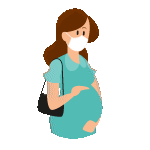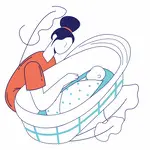In India there is a culture to take extra care of the pregnant lady. I won’t say that there is any harm in taking care and prenatal care is equally important but we often forget to take care of the lady who has just given birth. Pregnancy care consists of prenatal (before birth) and postpartum (after birth) healthcare for expectant mothers. Postnatal care is equally important for the new mom as the mother goes through many physical and emotional changes while learning to care for her newborn. Postpartum care involves getting proper rest, nutrition, and vaginal care. According to WHO -The postnatal period can be divided into three stages –
- the initial or acute phase, 6–12 hours after childbirth;
- subacute postnatal period, which lasts 2–6 weeks, and
- the delayed PNC, which can last up to 6 months.
In the subacute postpartum period, 87% to 94% of women report at least one health problem. Long term health problems (persisting after the delayed postpartum period) are reported by 31% of women.
What is postnatal care? Let me explain you what exactly is postnatal care.
The days and weeks following after the childbirth also know as postnatal period is a critical phase in the lives of mothers and new born babies. Postnatal care (PNC) for the mother should respond to her special needs, starting within an hour after the delivery of the placenta and extending it through the following six weeks. The care includes the prevention, early detection and treatment of complications, and the provision of counselling on breastfeeding, birth spacing, immunization and maternal nutrition.
Postnatal care (PNC) involves the following –
Checking the vital signs – Vital signs mean checking if the body temperature, blood pressure is normal or within the range. Vital signs should be done at least once a week. Vital signs are important because they are useful in detecting or monitoring medical problems.
- Counsel on the mother breastfeeding nutrition, hygiene, rest, and infant care including cord care.
- Promote birth registration and timely immunization according to national schedules for the newborn.
- Counselling the mother on - Excessive bleeding, headache, fits, fever, feeling very weak, breathing difficulties foul-smelling discharge, painful urination, severe abdominal or perennial pain.
Counselling on the following newborn danger signs:
- Poor sucking or inability to feed properly.
- Inactivity or lethargy
- Fast breathing, difficulty in breathing, chest or sub costal retraction
- Fever or body too cold
- Vomiting or abdominal distension
- Signs of umbilical infection (pus discharge at base, surrounding redness or swelling, foul smell.

Postnatal care is essential for 6-8 weeks after the baby is born. During this period, the mother goes through a number of physical and emotional changes and thus requires rest, nutrition and vaginal care. The main objectives here are:
- Prevent postpartum complications
- Restore mother to optimal health
- Ensure problem free breastfeeding
Sharing responsibility is essential for the health of the mother, after delivery. Get as much sleep as possible and pay attention to what you eat. Do not try and lose your pregnancy weight instantly. Schedule a check-up with your doctor six weeks after delivery to ensure your vagina has healed properly. Additionally, abstain from intercourse at this time. With proper care, every stage of your pregnancy can be a beautiful experience.
FAQs
1. What is postnatal care and why is it important?
Postnatal care refers to the essential medical and emotional support provided to a mother and her newborn immediately after childbirth. This phase, known as the postnatal period, focuses on recovery from delivery, breastfeeding support, nutrition, mental well-being, and baby health checks. It ensures that both mother and baby transition safely into their new routine.
2. What is postnatal?
When we talk about what is postnatal, it refers to anything related to the time after birth. This includes the mother's physical healing, emotional changes, lactation support, newborn care guidance, and monitoring for complications like infections or postpartum depression. The postnatal phase is crucial for stabilizing both mother and baby.
3. What does postnatal care include during the postnatal period?
During the postnatal period, care includes:
- Monitoring the mother’s physical recovery
- Managing stitches, C-section wounds, or bleeding
- Breastfeeding guidance
- Baby’s weight, feeding, and sleep monitoring
- Emotional and mental health support
- Vaccination schedule counselling
- This comprehensive support ensures a smoother and healthier recovery.
4. What is a postnatal clinic and how does it help?
A postnatal clinic specializes in providing medical care, counselling, and follow-up support after childbirth. New mothers visit these clinics for check-ups on healing, nutrition advice, breastfeeding assistance, and newborn examinations. Postnatal clinics are vital in detecting early complications and ensuring long-term well-being for both mother and child.
5. Who is considered a PNC patient?
A PNC patient (Postnatal Care patient) is any mother who has recently given birth and requires follow-up care. This includes mothers recovering from normal delivery, C-section, high-risk pregnancies, or those facing challenges like pain, breastfeeding issues, or fatigue. The newborn also undergoes essential monitoring as part of PNC care.
6. What is the definition of postnatal care?
The postnatal care definition is the complete set of healthcare services provided to a mother and newborn during the first six weeks after birth. This includes physical assessments, emotional support, nutrition guidance, lactation counselling, hygiene practices, and monitoring for potential complications.
7. How long does the postnatal period last?
The postnatal period typically lasts six weeks, though some mothers may need extended care depending on their recovery, delivery type, and medical condition. This period is essential for proper healing, establishing breastfeeding, and adjusting to motherhood.
8. What problems can be identified early through postnatal care?
Effective postnatal care helps detect:
- Excessive bleeding
- Infection
- High blood pressure
- Breastfeeding difficulties
- Postnatal depression
- Baby health issues like jaundice or feeding trouble
- Early intervention ensures smoother recovery and prevents complications.
9. When should a mother visit a postnatal clinic?
A new mother should visit a postnatal clinic within 3–7 days after delivery, followed by visits at 2 weeks and 6 weeks. High-risk cases or C-section mothers may require more frequent follow-ups.
10. What support does a PNC patient receive emotionally?
A PNC patient receives guidance for mood swings, anxiety, and postpartum depression risk. Emotional support is equally important as physical healing, helping mothers adjust to new responsibilities in the postnatal phase.





















